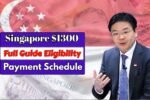Join on WhatsApp
Get the latest updates directly on WhatsApp – motivation, news & more!
Singapore has long been one of the most popular destinations in Asia for tourism, business, and education. Known for its strong economy, efficient systems, and cultural diversity, the city-state attracts millions of visitors and migrants every year. In 2025, the Singapore government has introduced a new rule requiring mandatory verification calls for visa applicants. This policy is part of an effort to strengthen border security, reduce fraud, and ensure that only genuine applicants receive approval. The new rule is expected to affect students, professionals, tourists, and business travellers applying for entry into Singapore.
Why Verification Calls Are Being Introduced
The demand for visas to Singapore has increased significantly in recent years, with applications coming from every corner of the world. Authorities have noted a growing number of fraudulent applications, incomplete documents, and misrepresentations of intent. While existing systems like biometric checks and document verification have been effective, they are not always enough to detect inconsistencies. The mandatory verification calls are designed to serve as an additional layer of security. By speaking directly with applicants, immigration officers can confirm details, cross-check information, and prevent fraudulent entries into the country.
How the Verification Calls Work
When an applicant submits a visa application, they will now be informed that a verification call is required before the final decision is made. The call may be conducted by phone or through a secure video platform, depending on the applicant’s location and the type of visa. During the call, officers will ask questions about travel plans, accommodation details, purpose of visit, and sometimes employment or education history. For student and work visa applicants, more detailed questions about universities, employers, and financial arrangements may be included. The goal is to ensure that all information matches the documents provided.
Impact on Different Visa Categories
The rule applies broadly to all major visa categories, though the intensity of questioning may vary. For tourist visas, the calls are expected to be short and focused on verifying the itinerary, return plans, and financial stability. Student visa applicants may face longer sessions, with officers confirming acceptance letters, tuition payments, and plans for accommodation. Business visa applicants may be asked about meetings, partnerships, or planned investments. The new rule makes it clear that regardless of the purpose of travel, every applicant should be prepared for direct interaction with immigration officials.
Benefits of the New Rule
Supporters of the mandatory verification calls argue that the system will bring several benefits. First, it will significantly reduce the chances of fraudulent applications being approved. Second, it provides authorities with real-time information, making it harder for applicants to provide false details. Third, it builds trust in the visa system, reassuring Singaporeans that the government is protecting national interests while welcoming genuine visitors. For applicants, the calls can also serve as an opportunity to clarify any confusion or errors in their applications before a final decision is made.
Concerns and Criticism
While the policy is seen as a step toward stronger border control, it has also raised concerns. Some applicants worry about delays in processing times, as verification calls add an extra step to the procedure. Others fear language barriers, since not all applicants may be comfortable speaking English fluently during the call. There are also concerns about time zones, since applicants may be located in different parts of the world. Privacy advocates have asked for guarantees that the information shared during calls will be stored securely and not misused.
Preparing for the Verification Call
Applicants can prepare for the verification call by reviewing their submitted documents carefully. They should be ready to answer questions about travel dates, addresses in Singapore, and their reasons for visiting. For students, this means knowing the details of their course and institution, while for workers, it means being familiar with the employer and job offer. It is important to keep the tone honest and confident, as inconsistencies or hesitation may raise red flags. Practicing answers beforehand can help reduce nervousness during the call.
Will Processing Times Change
One of the biggest questions surrounding the new rule is whether visa processing will slow down. The government has assured applicants that additional staff and resources are being deployed to handle the increased workload. The verification calls are expected to add only a few days to the process in most cases. However, during peak travel seasons, such as summer holidays or major international events, some delays may occur. Applicants are advised to apply well in advance of their intended travel dates to avoid last-minute complications.
Long-Term Goals of the Policy
The mandatory verification calls are not just a short-term measure. They are part of Singapore’s broader strategy to modernise its immigration system, combining digital technology with human verification. In the future, artificial intelligence tools may help screen applications more quickly, while officers handle the final verification through calls. The long-term goal is to make the visa process more secure without making it excessively difficult for genuine travellers. If successful, the policy could set an example for other countries facing similar challenges.
Reaction from Applicants and Agencies
Travel agencies, universities, and multinational companies have reacted with mixed views. Some appreciate the added security and believe it will enhance Singapore’s reputation as a safe destination. Others worry that the extra step may discourage some visitors or create additional stress for students and workers already navigating complex processes. Agencies are now advising their clients to factor in extra time for verification calls when planning their applications.
Conclusion
The introduction of mandatory verification calls for visa applicants in Singapore in 2025 marks a significant change in the country’s immigration policy. By adding a direct layer of communication between applicants and authorities, the government aims to reduce fraud, increase security, and protect national interests. While the new rule may create small delays and pose challenges for some applicants, it also reinforces Singapore’s commitment to being a safe and well-regulated global hub. For those planning to apply, preparation and honesty will be the key to navigating this new requirement successfully.



